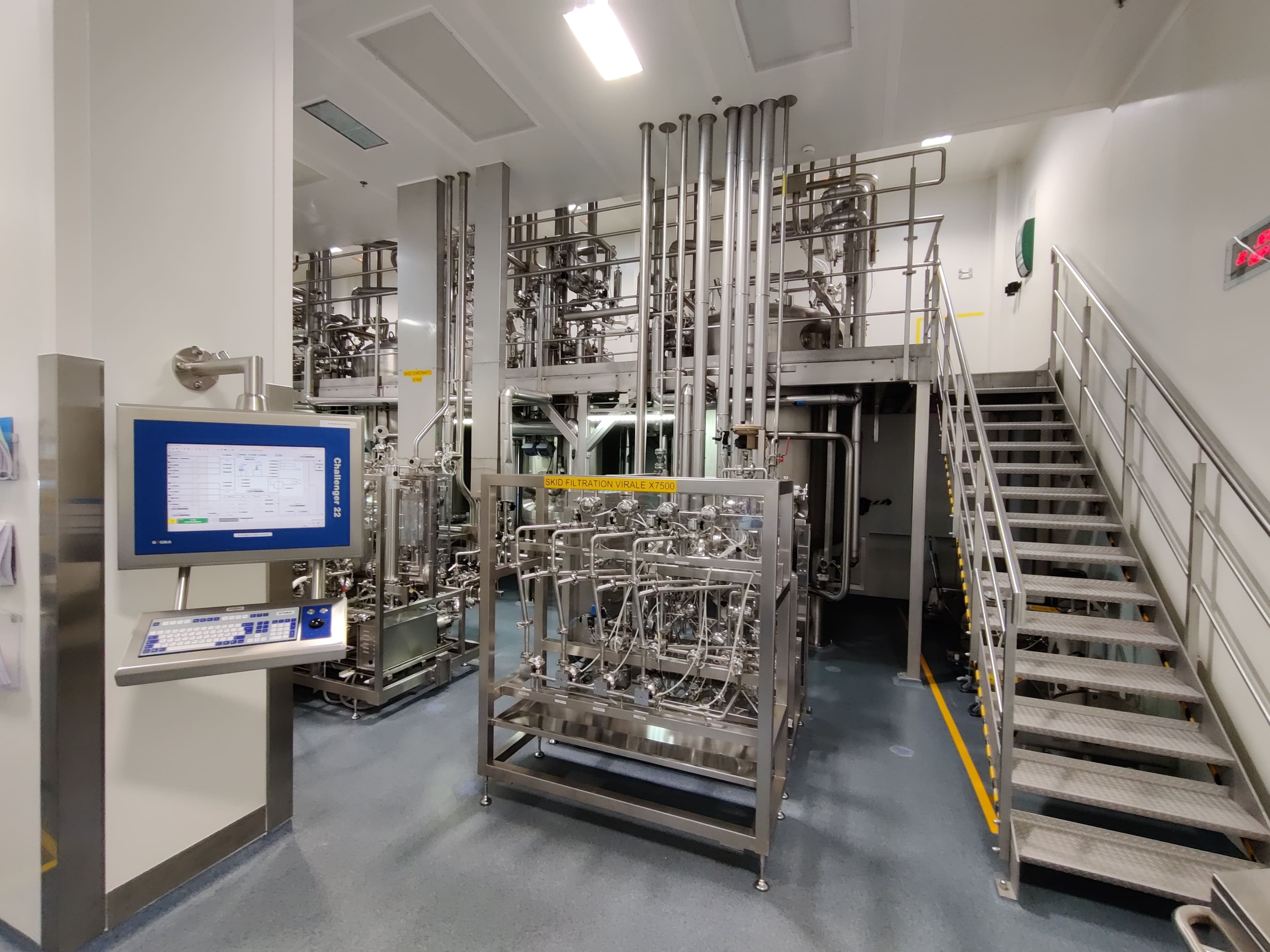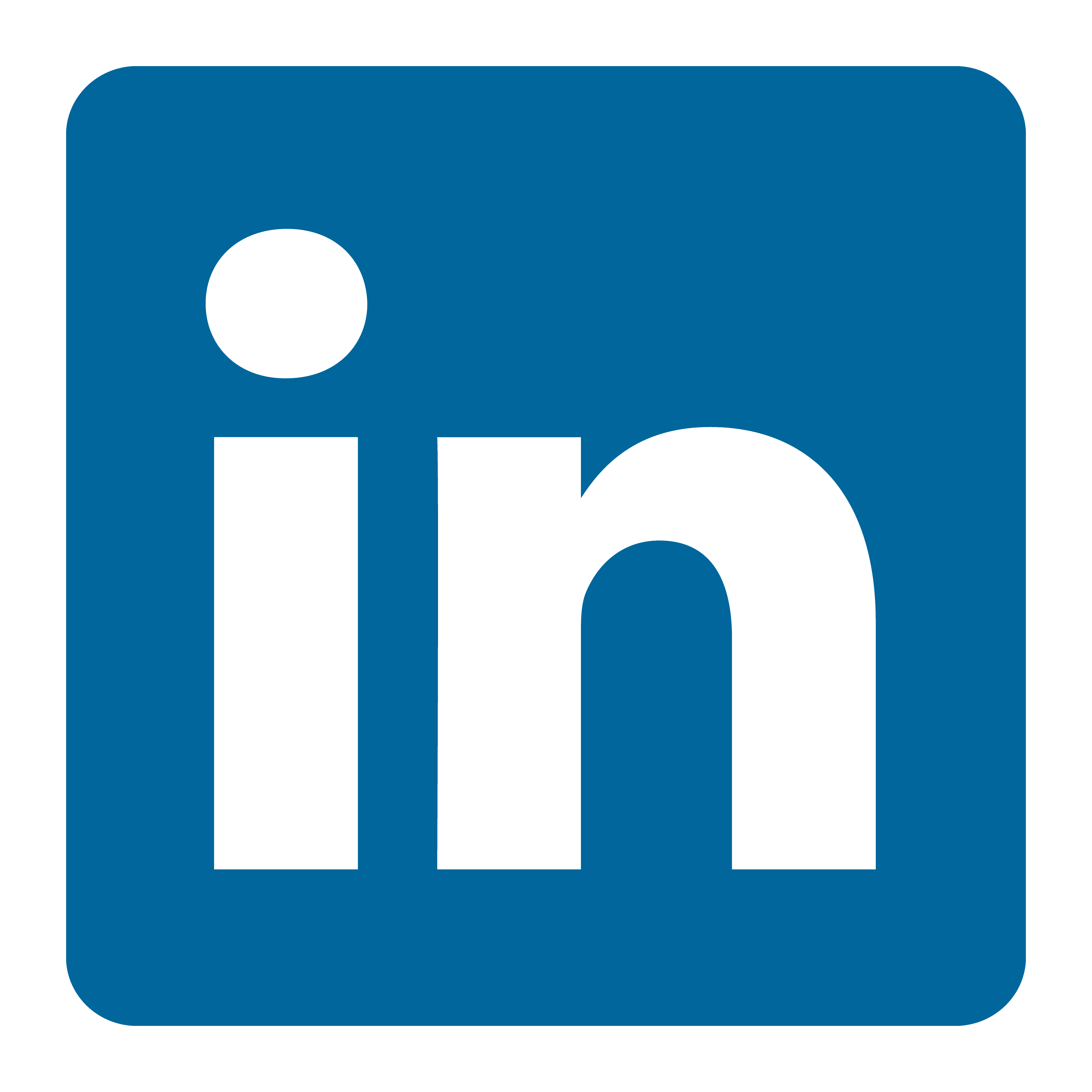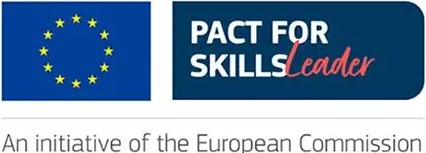DSP (Downstream process) in cGMPS
Biopharmaceutical purification in a cGMP environment: biomolecule separation and clarification, in-process quality control, viral validation, cleaning, data integrity, and industrial performance tools.
CURRICULUM
Available in French, English
about 13 hours of content
Curriculum 4
Goals
In summary
Prerequisites
Scientific background, initial experience in bioindustries, chemistry, pharmacy.
Alternatively, having completed the introductory course "Discovering the bioproduction plant environment" beforehand.
Alternatively, having completed the introductory course "Discovering the bioproduction plant environment" beforehand.
Course modules
about 13 hours
DSP (Downstream process) in cGMPS
P4 Initial Evaluation (10 minutes)
Make sure you have answered the Placement Quiz : Initial Assessment before starting your journey.Once this module is completed, you will be able to move on to the next activities in your journey.
P1M1 Discovering biopharmaceuticals: key development stages, regulatory framework, and manufacturing processes (about 1 hour)
Description : This module provides an introduction to biopharmaceuticals, their specific characteristics, the main stages of their development, and the production processes used in bioproduction.It is based on the regulatory frameworks governing the development of biopharmaceuticals, such as Good Manufacturing Practices (GMP), ICH guidelines, the requirements of regulatory agencies (EMA, FDA), as well as the key stages of production processes (USP, DSP, Fill & Finish).Digital modalities : Activity 1: eLearning / Activity 2 : eLearningTarget audience :Newcomers (technicians, engineers, researchers, and managers) preparing to take up a position in bioproduction or wishing to update their knowledgeStudents and teachers seeking to discover the pharmaceutical industrial environment and the challenges associated with biopharmaceutical production.Support functions (maintenance, regulatory, Quality, HSE, supply chain, Lean, PMO, data) wishing to better understand the fundamentals of bioproduction professionsEmployees in commercial functions, market access, management or partners (suppliers, subcontractors, consultants, investors) not familiar with bioproduction but wishing to better understand the ecosystem and challenges of bioproductionEvaluation procedure :A short evaluation at the end of the module confirming what you have learnt and enabling you to move to the next one (no limit of attempts, 80% of correct answers required).Trainees enrolled in the whole curriculum have the possibility to assess and set their new knowledges and skills via an anchoring quiz between modules
P4M2 DSP Process in cGMPs (about 3 hours)
This module presents the application of Good Manufacturing Practices (GMPs / cGMPs) to purification steps (Downstream Process – DSP), detailing the objectives of quality, purity, and safety, as well as the unit operations involved (clarification, chromatography, diafiltration).It covers chromatography and filtration techniques, in-process controls (IPCs), and is based on cGMP guidelines (FDA, ICH) that govern quality documentation (SOPs, batch records) and deviation management tools.Digital modalities : Activity 1: Serious Game 2D / Activity 2 : Serious Game 2D / Activity 3 : eLearning 360°Target audience : Operators, technicians, production managers, continuous improvement and performance managers, engineering managers, maintenance staff, or project managers in the pharmaceutical, chemical, or biotechnology sectors.Collaborators joining or working at the interface of a bioproduction unit.Quality Assurance or Quality Control personnel operating in bioproduction.Students in life sciences, pharmacy, or chemistry, or individuals from academic backgrounds seeking to understand the industrial environment of biomedicine purification.Evaluation procedures : A short evaluation at the end of the module confirming what you have learnt and enabling you to move to the next one ( 80% of correct answers required).
P4M3 Behaviors in DSP in cGMPs and Industrial Environment (about 2 hours)
This module teaches the expected behaviors in a controlled DSP environment compliant with cGMP standards, with a focus on contamination prevention, strict hygiene, and the proper handling of high-risk operations.The module is based on cGMP standards, classifications of controlled environments (ISO / EU A-B-C-D), class A equipment (biosafety cabinets, laminar flow hoods), quality procedures (gowning, cleaning, sampling), and deviation management tools such as CAPA and documentation protocols.Digital modalities : Activity 1 : Serious Game 2D / Activity 2 : Serious Game 2D / Activity 3 : Serious Game 3DTarget audience : Operators, technicians, production managers, continuous improvement and performance managers, engineering managers, maintenance staff, or project managers in the pharmaceutical, chemical, or biotechnology sectors.Collaborators joining or working at the interface of a bioproduction unit.Quality Assurance or Quality Control personnel operating in bioproduction.Students in life sciences, pharmacy, or chemistry, or individuals from academic backgrounds seeking to understand the industrial environment of biomedicine purification.Evaluation procedures : A short evaluation at the end of the module confirming what you have learnt and enabling you to move to the next one ( 80% of correct answers required).
P4M4 Viral clearance (about 2 hours)
Information importante : Si vous choisissez la version accessible d'une activité 3D ou en réalité virtuelle, veuillez contacter le service d’assistance pour débloquer manuellement la suite de la formation.This module presents the sources of viral contamination, the viral clearance steps integrated into the DSP (purification) process, and the principles of viral validation studies.It details the mechanisms of virus inactivation and removal, the three pillars of viral safety, as well as the regulatory requirements governing validation studies.The content is based on ICH Q5A guidelines, cGMP practices, raw material risk assessment, and the methodology of conducting viral validation studies. Modalités digitales : Activité 1: Serious Game 2D / Activité 2: Serious Game 3D / Activité 3: Serious Game 2DTarget audience : Operators, technicians, production managers, continuous improvement and performance managers, engineering managers, maintenance staff, or project managers in the pharmaceutical, chemical, or biotechnology sectors.Collaborators joining or working at the interface of a bioproduction unit.Quality Assurance or Quality Control personnel operating in bioproduction.Students in life sciences, pharmacy, or chemistry, or individuals from academic backgrounds seeking to understand the industrial environment of biomedicine purification.Evaluation procedures : Une courte évaluation à la fin du module pour confirmer ce que vous avez appris et accéder au module suivant (80% de bonnes réponses requises).
P4 Initial Evaluation (10 minutes)
Make sure you have answered the Placement Quiz : Initial Assessment before starting your journey.Once this module is completed, you will be able to move on to the next activities in your journey.
P1M1 Discovering biopharmaceuticals: key development stages, regulatory framework, and manufacturing processes (about 1 hour)
Description : This module provides an introduction to biopharmaceuticals, their specific characteristics, the main stages of their development, and the production processes used in bioproduction.It is based on the regulatory frameworks governing the development of biopharmaceuticals, such as Good Manufacturing Practices (GMP), ICH guidelines, the requirements of regulatory agencies (EMA, FDA), as well as the key stages of production processes (USP, DSP, Fill & Finish).Digital modalities : Activity 1: eLearning / Activity 2 : eLearningTarget audience :Newcomers (technicians, engineers, researchers, and managers) preparing to take up a position in bioproduction or wishing to update their knowledgeStudents and teachers seeking to discover the pharmaceutical industrial environment and the challenges associated with biopharmaceutical production.Support functions (maintenance, regulatory, Quality, HSE, supply chain, Lean, PMO, data) wishing to better understand the fundamentals of bioproduction professionsEmployees in commercial functions, market access, management or partners (suppliers, subcontractors, consultants, investors) not familiar with bioproduction but wishing to better understand the ecosystem and challenges of bioproductionEvaluation procedure :A short evaluation at the end of the module confirming what you have learnt and enabling you to move to the next one (no limit of attempts, 80% of correct answers required).Trainees enrolled in the whole curriculum have the possibility to assess and set their new knowledges and skills via an anchoring quiz between modules
P4M2 DSP Process in cGMPs (about 3 hours)
This module presents the application of Good Manufacturing Practices (GMPs / cGMPs) to purification steps (Downstream Process – DSP), detailing the objectives of quality, purity, and safety, as well as the unit operations involved (clarification, chromatography, diafiltration).It covers chromatography and filtration techniques, in-process controls (IPCs), and is based on cGMP guidelines (FDA, ICH) that govern quality documentation (SOPs, batch records) and deviation management tools.Digital modalities : Activity 1: Serious Game 2D / Activity 2 : Serious Game 2D / Activity 3 : eLearning 360°Target audience : Operators, technicians, production managers, continuous improvement and performance managers, engineering managers, maintenance staff, or project managers in the pharmaceutical, chemical, or biotechnology sectors.Collaborators joining or working at the interface of a bioproduction unit.Quality Assurance or Quality Control personnel operating in bioproduction.Students in life sciences, pharmacy, or chemistry, or individuals from academic backgrounds seeking to understand the industrial environment of biomedicine purification.Evaluation procedures : A short evaluation at the end of the module confirming what you have learnt and enabling you to move to the next one ( 80% of correct answers required).
P4M3 Behaviors in DSP in cGMPs and Industrial Environment (about 2 hours)
This module teaches the expected behaviors in a controlled DSP environment compliant with cGMP standards, with a focus on contamination prevention, strict hygiene, and the proper handling of high-risk operations.The module is based on cGMP standards, classifications of controlled environments (ISO / EU A-B-C-D), class A equipment (biosafety cabinets, laminar flow hoods), quality procedures (gowning, cleaning, sampling), and deviation management tools such as CAPA and documentation protocols.Digital modalities : Activity 1 : Serious Game 2D / Activity 2 : Serious Game 2D / Activity 3 : Serious Game 3DTarget audience : Operators, technicians, production managers, continuous improvement and performance managers, engineering managers, maintenance staff, or project managers in the pharmaceutical, chemical, or biotechnology sectors.Collaborators joining or working at the interface of a bioproduction unit.Quality Assurance or Quality Control personnel operating in bioproduction.Students in life sciences, pharmacy, or chemistry, or individuals from academic backgrounds seeking to understand the industrial environment of biomedicine purification.Evaluation procedures : A short evaluation at the end of the module confirming what you have learnt and enabling you to move to the next one ( 80% of correct answers required).
P4M4 Viral clearance (about 2 hours)
Information importante : Si vous choisissez la version accessible d'une activité 3D ou en réalité virtuelle, veuillez contacter le service d’assistance pour débloquer manuellement la suite de la formation.This module presents the sources of viral contamination, the viral clearance steps integrated into the DSP (purification) process, and the principles of viral validation studies.It details the mechanisms of virus inactivation and removal, the three pillars of viral safety, as well as the regulatory requirements governing validation studies.The content is based on ICH Q5A guidelines, cGMP practices, raw material risk assessment, and the methodology of conducting viral validation studies. Modalités digitales : Activité 1: Serious Game 2D / Activité 2: Serious Game 3D / Activité 3: Serious Game 2DTarget audience : Operators, technicians, production managers, continuous improvement and performance managers, engineering managers, maintenance staff, or project managers in the pharmaceutical, chemical, or biotechnology sectors.Collaborators joining or working at the interface of a bioproduction unit.Quality Assurance or Quality Control personnel operating in bioproduction.Students in life sciences, pharmacy, or chemistry, or individuals from academic backgrounds seeking to understand the industrial environment of biomedicine purification.Evaluation procedures : Une courte évaluation à la fin du module pour confirmer ce que vous avez appris et accéder au module suivant (80% de bonnes réponses requises).
P4M5 Equipment Cleaning in DSP (about 2 hours)
Important information : If you choose the accessible version of a 3D or virtual reality activity, please contact the support team to manually unlock the rest of the training.This module presents cleaning methods for equipment used in Downstream Processing (DSP), highlighting their essential role in preventing contamination and ensuring compliance with quality standards in bioproduction.It is based on cGMP guidelines, in-place cleaning (CIP) and sanitization (SaIP) techniques, validation strategies (3 consecutive batches), analytical criteria (endotoxins, pH, conductivity), as well as quality documentation (batch records, sampling procedures) and deviation investigation practices.Digital modalities : Activity 1: Serious Game 2D / Activity 2 : Serious Game 2D / Activity 3 : Serious Game 3DTarget audience : Operators, technicians, production managers, continuous improvement and performance managers, engineering managers, maintenance staff, or project managers in the pharmaceutical, chemical, or biotechnology sectorsCollaborators joining or working at the interface of a bioproduction unit.Quality Assurance or Quality Control personnel operating in bioproduction.Students in life sciences, pharmacy, or chemistry, or individuals from academic backgrounds seeking to understand the industrial environment of biomedicine purification.Evaluation procedures : A short evaluation at the end of the module confirming what you have learnt and enabling you to move to the next one ( 80% of correct answers required).
P4M6 In-Process Controls (IPCs) for DSP in cGMPs (about 2 hours)
This module presents In-Process Controls (IPCs) applied to the purification steps (Downstream Process – DSP) in a cGMP environment, highlighting their role in monitoring critical process parameters, managing contamination risks, and ensuring product quality.It draws on cGMP and ICH guidelines, analytical methods used for IPCs (pH measurement, conductivity, CE-SDS, cIEF, HPLC-SEC, qPCR, ELISA, LAL), sampling practices both in-zone and off-zone, the PAT initiative for in-line monitoring, as well as the concept of Critical Quality Attributes (CQAs) to ensure product quality throughout the processDigital modalities : Activity 1: eLearning / Activity 2 : Serious Game 2D / Activity 3 : Serious Game 2DTarget audience : Operators, technicians, production managers, continuous improvement and performance managers, engineering managers, maintenance staff, or project managers in the pharmaceutical, chemical, or biotechnology sectorsCollaborators joining or working at the interface of a bioproduction unit.Quality Assurance or Quality Control personnel operating in bioproduction.Students in life sciences, pharmacy, or chemistry, or individuals from academic backgrounds seeking to understand the industrial environment of biomedicine purification.Evaluation procedures : A short evaluation at the end of the module confirming what you have learnt and enabling you to move to the next one ( 80% of correct answers required).
P4M7 Data integrity for DSP in cGMPs (about 2 hours)
This module presents principles of data integrity applied to downstream processing (DSP) steps in a cGMP environment, highlighting their importance for traceability, regulatory compliance, and patient safety.It is based on the ALCOA+ framework, FDA’s 21 CFR Part 11 requirements, deviation analysis methods (5W, 5M, 5 Whys), the CAPA model for managing non-conformities, as well as key challenges related to data digitalization in bioproduction.Digital modalities : Activity 1 : eLearning / Activity 2 : Serious Game 2D / Activity 3 : Serious Game 2D Target audience : Operators, technicians, production managers, continuous improvement and performance managers, engineering managers, maintenance staff, or project managers in the pharmaceutical, chemical, or biotechnology sectors.Collaborators joining or working at the interface of a bioproduction unit.Quality Assurance or Quality Control personnel operating in bioproduction.Students in life sciences, pharmacy, or chemistry, or individuals from academic backgrounds seeking to understand the industrial environment of biomedicine purification.Evaluation procedures : A short evaluation at the end of the module confirming what you have learnt and enabling you to move to the next one ( 80% of correct answers required).
P4M8 DSP - Applicative module (40 minutes)
Important information : If you choose the accessible version of a 3D or virtual reality activity, please contact the support team to manually unlock the rest of the training.This immersive module allows learners to practice advanced purification (DSP) steps in a cGMP environment, including affinity chromatography, tangential flow filtration (TFF), final 0.22μm filtration, and clean-in-place (CIP) procedures.It is based on cGMP guidelines, standard operating procedures (SOPs), in-process controls (IPCs), quality control (QC) sampling protocols, and real-world calibration and equipment verification practices.Digital modalities : Activity 1 : Virtual RealityTarget audience : Operators, technicians, production managers, continuous improvement and performance managers, engineering managers, maintenance staff, or project managers in the pharmaceutical, chemical, or biotechnology sectors.Collaborators joining or working at the interface of a bioproduction unit.Quality Assurance or Quality Control personnel operating in bioproduction.Students in life sciences, pharmacy, or chemistry, or individuals from academic backgrounds seeking to understand the industrial environment of biomedicine purification.Evaluation procedures : A short evaluation at the end of the module confirming what you have learnt and enabling you to move to the next one ( 80% of correct answers required).
Final evaluation: DSP (Downstream process) in cGMPs (30 minutes)
This final module assesses the knowledge acquired throughout the course with a quiz featuring questions from all training modules.
P4 Final Evaluation (30 minutes)
This last module evaluates the knowledge acquired throughout the course through a quiz featuring questions from all training modules (maximum 3 attempts, 80% correct answers required).
Available in French, English
about 13 hours of content
Curriculum 4
Cookies
By continuing to browse this site, you agree to the use of cookies to optimize your experience and offer you content tailored to your needs. You may object to this use of cookies at any time.
By continuing to browse this site, you agree to the use of cookies to optimize your experience and offer you content tailored to your needs. You may object to this use of cookies at any time.
You can choose what you authorize
Only necessary cookies
Performance cookies
Feature cookies
Personnalisation cookies
Ads cookies
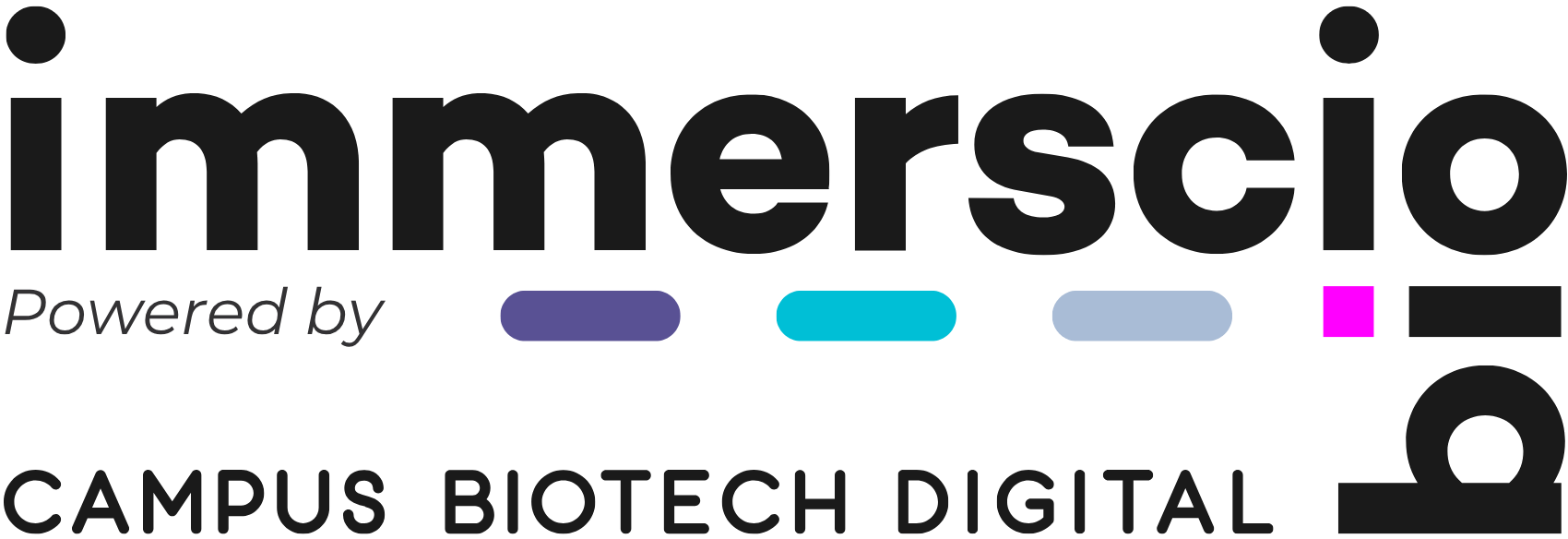
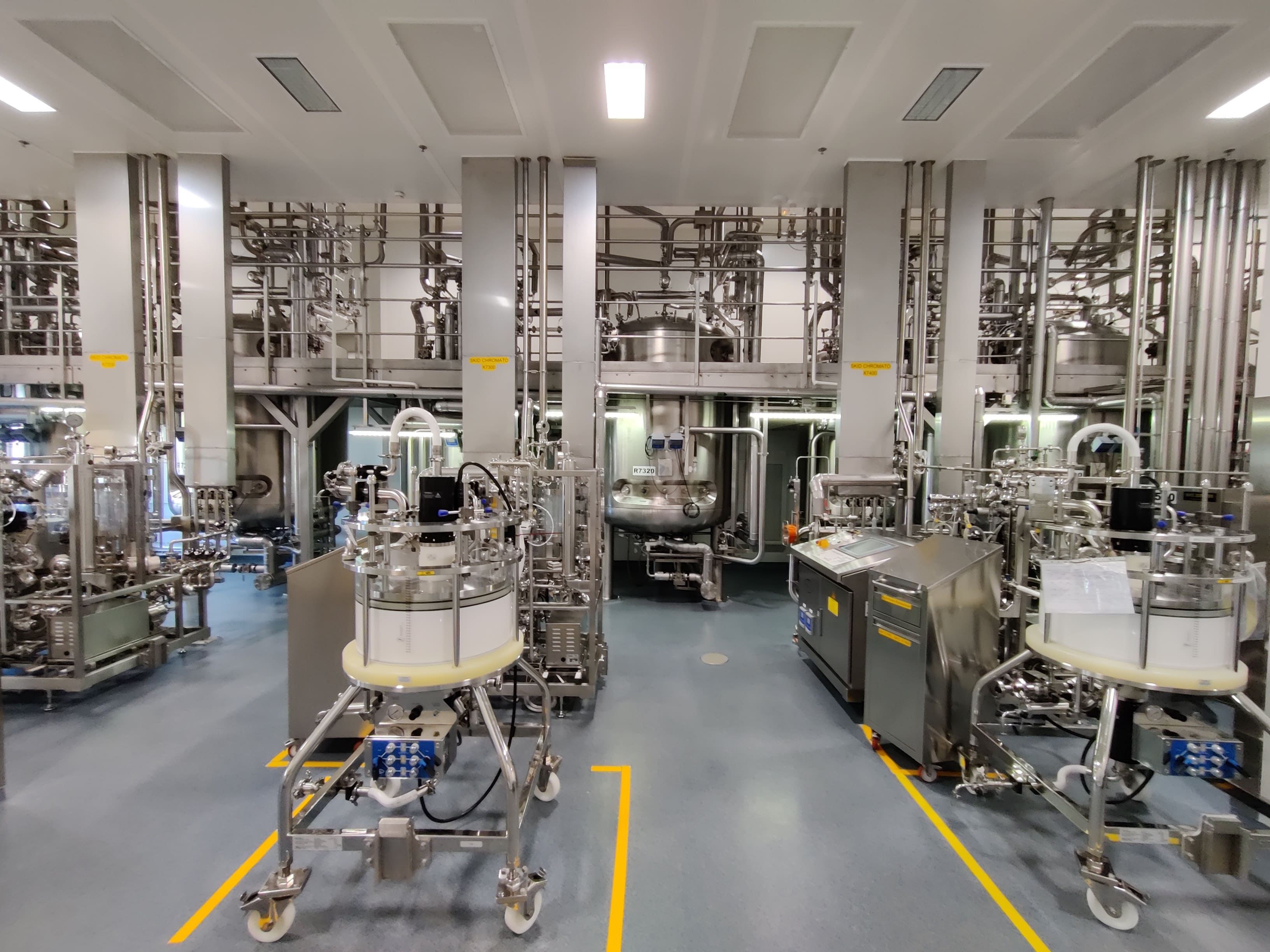 >
>
